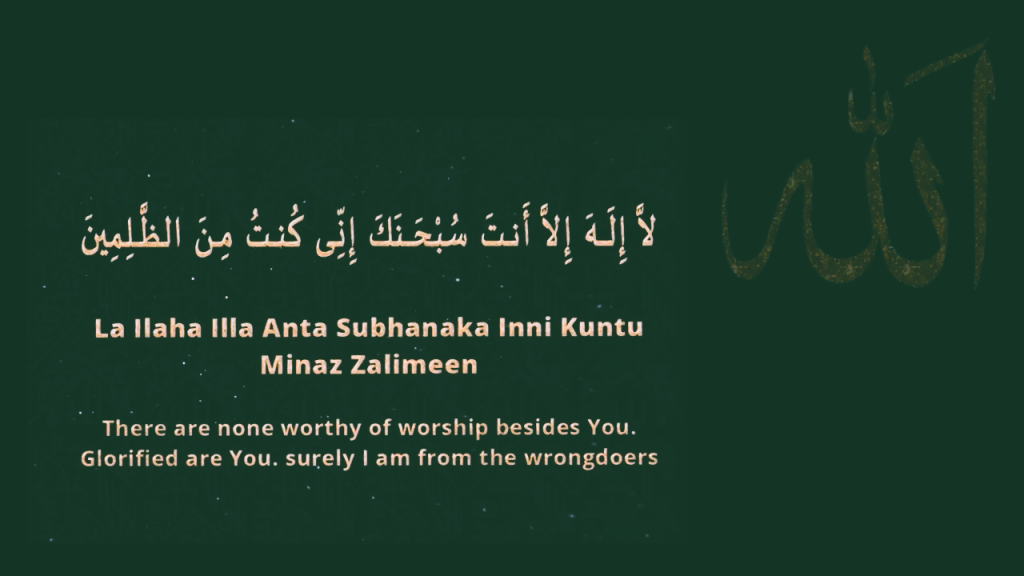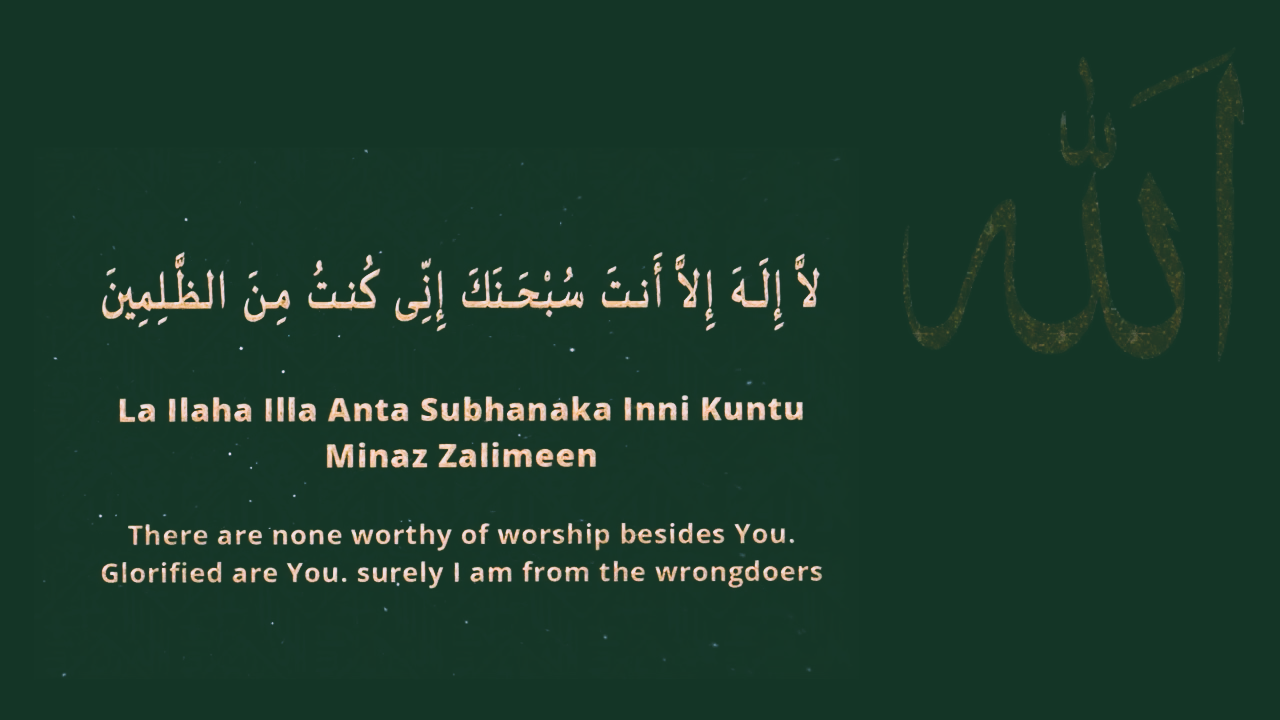Introduction
- Brief explanation of du‘a in Islam
- Introduction to this specific du‘a from Surah Al-Anbiya
- Importance of learning powerful Qur’anic du’as for daily life
- Mention Prophet Yunus (AS) and his story briefly
Target keyword: La Illah Illa Anta Subhananka Dua
LSI keywords: powerful Islamic du‘a, Prophet Yunus prayer, Qur’anic supplication

La Illah Illa Anta Subhananka Dua Arabic Text, Transliteration & Translation
Arabic:
لَا إِلَٰهَ إِلَّا أَنتَ سُبْحَانَكَ إِنِّي كُنتُ مِنَ الظَّالِمِينَ
Transliteration:
La ilaha illa anta subhanaka inni kuntu minaz-zalimeen
The Story Behind the Du‘a – Prophet Yunus
- Brief narrative of Prophet Yunus (AS) and the people of Nineveh
- His departure, the ship, the storm, and the whale
- The moment of realization inside the belly of the whale
- Why this du‘a was made and how Allah responded
Target keyword: Prophet Yunus du‘a
Secondary keywords: Yunus whale story, Qur’an du‘a for hardship
Here is a complete, SEO-friendly, human-written blog structure for the du‘a: “La ilaha illa anta subhanaka inni kuntu minaz-zalimin” — with meaning in Urdu and English, benefits, and the impact of reciting it 41, 100, or 1000 times.
La Illah Illa Anta Subhananka Dua English Meaning
“There is no deity except You; Glory be to You! Indeed, I was of the wrongdoers.”
This is a declaration of Tawheed (Oneness of Allah), Tasbeeh (Glorification), and Tawbah (Repentance).
La Illah Illa Anta Subhananka Dua Urdu Translation (اردو ترجمہ)
“نہیں ہے کوئی معبود سوائے آپ کے، پاک ہیں آپ، بے شک میں ہی ظالموں میں سے تھا۔”
یہ دعا حضرت یونس علیہ السلام نے مچھلی کے پیٹ میں توبہ کے وقت پڑھی تھی۔
Why Is This Du‘a Special?
- Mentioned directly in the Qur’an.
- Spoken by a prophet in utter desperation.
- Allah responded to it immediately (Surah Al-Anbiya 21:88).
Spiritual Themes Inside This Du‘a
| Arabic Word | Meaning | Spiritual Message |
|---|---|---|
| La ilaha illa Anta | There is no god but You | Pure Tawheed |
| Subhanaka | Glory be to You | Affirmation of Allah’s perfection |
| Inni kuntu minaz-zalimin | I was among the wrongdoers | Admission of sin (Tawbah) |
Benefits of Reciting “La Illah Illa Anta Subhananka Dua”
- Forgiveness of sins (especially major sins).
- Relief from hardship and depression.
- Acceptance of Du‘a.
- Strengthens connection with Allah.
- Calms the heart in anxiety and loneliness.
- Recited in times of distress, as the Prophet ﷺ recommended.
How Many Times Should You Recite It? (Explained)
41 Times
- Ideal for daily practice.
- Builds a habit of reflection and repentance.
- Common in morning or evening routine.
100 Times
- Many people use this number for urgent dua, especially in hardships.
- Based on the general practice of 100 tasbeehs mentioned in Hadith.
- Can be used for emotional relief or a clear heart.
1000 Times
- Often done during Qiyam ul-Lail (Tahajjud) or intense need.
- Recite with tears and humility, not as a number ritual.
- Intention matters more than numbers — focus on meaning and sincerity.

When Should You Read It?
- During illness
- While crying or depressed
- During Salah, especially in Sujood
- After Fajr or before sleeping
- When seeking forgiveness
- When making Du‘a for someone else
La Illah Illa Anta Subhananka Dua Hadith About This Du‘a
The Prophet Muhammad ﷺ said:
“No Muslim supplicates with the du‘a of Yunus, except that Allah will respond to him.”
(Tirmidhi 3505)
Deep Meaning of Each Phrase
Break the du‘a into three parts:
- La ilaha illa Anta (Tawheed – Oneness of God)
- Subhanaka (Glorifying Allah – declaring Him free from all imperfections)
- Inni kuntu minaz-zalimeen (admission of one’s own mistake)
Discuss:
- Tawbah (repentance)
- Humility before Allah
- Recognizing one’s limits and Allah’s power
Target keyword: La ilaha illa anta meaning
LSI keywords: du‘a for repentance, Islamic humility
La Illah Illa Anta Subhananka Dua Best Times to Recite This Du‘a
- During distress or calamity
- After salah (especially tahajjud)
- In sujood
- During illness or while seeking forgiveness
- When overwhelmed with guilt or fear
Target keyword: when to recite la ilaha illa anta subhanaka
Tip: Use bullet points for easy SEO and readability.
How to Integrate This Du‘a Into Your Life
- Set it as your morning/evening dhikr
- Repeat it during daily tasks (driving, cooking, walking)
- Teach it to children with meaning
- Write it down and place it where you’ll see it often (e.g., phone lock screen)
LSI keywords: Islamic routine, daily du‘a habits, du‘a practice tips
Why Is This Du‘a So Powerful?
- It is the du‘a of Prophet Yunus (AS), made in extreme isolation and distress.
- Allah responded immediately, showing it’s a du‘a with guaranteed acceptance when made sincerely.
- Scholars say this du‘a carries the essence of Tawheed, Tasbeeh, and Tawbah—three pillars of accepted prayer.
Reference:
Ibn Kathir in his tafsir highlights that whoever makes this du‘a in hardship will be relieved, by Allah’s permission.
How This Du‘a Fits into Modern Life
Discuss its relevance for La Illah Illa Anta Subhananka Dua:
- Students stressed about exams
- Parents facing anxiety or depression
- People burdened with past mistakes or guilt
- Anyone suffering grief, heartbreak, or loneliness
Tip: You can even mention it as an antidote to modern overwhelm, mental health struggles, and emotional exhaustion.
13. Variations in Transliteration
For SEO purposes, include common search spellings:
- La ilaha illa anta
- La ilaha illa anta subhanaka inni kuntu min al-zalimeen
- La ilaha illa anta dua Yunus
- Prophet Yunus dua in belly of whale
This helps your article show up for multiple search queries.
Frequently Asked Questions (FAQ) Section
Q1: Who said “La ilaha illa anta subhanaka inni kuntu minaz-zalimeen”?
A: This du‘a(La Illah Illa Anta Subhananka Dua) was said by Prophet Yunus (AS) while he was in the belly of the whale, seeking Allah’s forgiveness and mercy.
Q2: Can I say this du‘a in any situation?
A: Yes, this du‘a is appropriate for any time of distress, repentance, hardship, or need for spiritual connection. It is not limited to one scenario.
Q3: Is there a hadith about this du‘a being accepted?
A: Yes. The Prophet Muhammad ﷺ said:
“The supplication of Dhun-Nun (Yunus) when he supplicated while in the belly of the whale: ‘La ilaha illa anta subhanaka inni kuntu minaz-zalimeen’. No Muslim supplicates with it for anything, except that Allah will answer him.” (Tirmidhi)
Q4: How many times should I read this du‘a?
A: There is no fixed number. You can read it as often as you like, especially during distress, in prayer, or in sujood.
Q5: What is the meaning of “inni kuntu minaz-zalimeen”?
A: It means: “Indeed, I was among the wrongdoers.” It’s an admission of your own faults, showing humility and seeking Allah’s mercy.
Q6: Is this du‘a only for prophets or can anyone say it?
A: Anyone can say it. The Qur’an shares this du‘a with us as a model prayer, not just a prophetic one.
Q7: Can this du‘a be used for making a wish come true?
A: While it’s not a “wish-granting” formula, it is a powerful du‘a for seeking Allah’s help, especially when you’re in sincere need or hardship.
Q8: Can I say this du‘a in English?
A: Yes, though saying it in Arabic is best. However, understanding and saying the meaning in your own language is still valid and beloved to Allah.
Conclusion
- Wrap up importance of this du‘a
- Reaffirm its meaning, power, and application
- Encourage readers to memorize it
- Add a small final reminder: “Never underestimate the power of a heartfelt du‘a.”

AoA, my name is Abd al-Rahman, and my vision is to spread the knowledge of the Quran to everyone. I am proud and tall while standing as your trusted mentor on the journey of learning and memorizing the Holy Quran. I, along with a committed team of Islamic teachers, am bound to provide an easy online facility for Islamic studies and Hifz programs.

